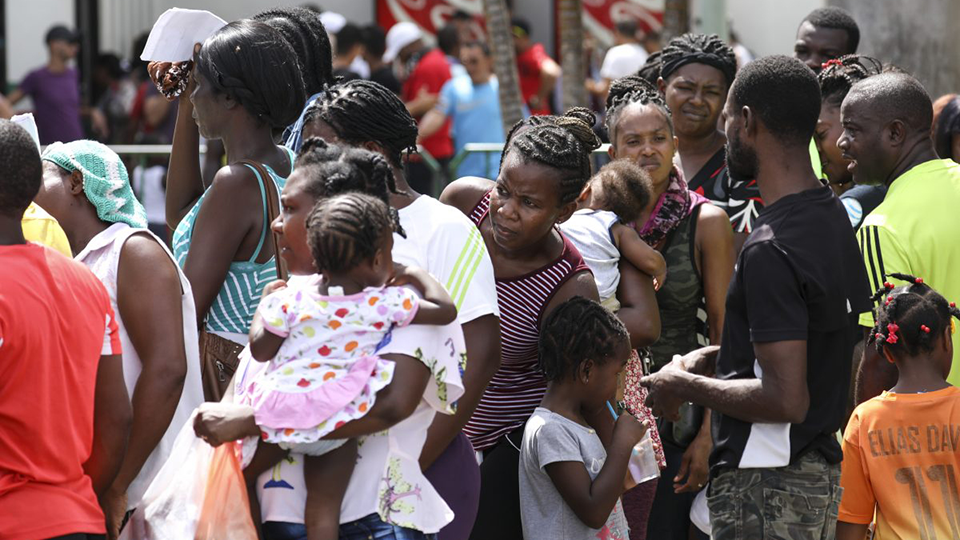Trump’s Deportation Plan for Springfield Sparks Controversy and Raises Broader Immigration Debate
Former President Donald Trump has vowed to initiate mass deportations from Springfield, Ohio.

Former President Donald Trump has vowed to initiate mass deportations from Springfield, Ohio, amid false claims that Haitian migrants in the town have been “eating pets.” Speaking at his golf course in California on Friday, Trump labeled the situation a “destruction” of the community, further pledging what he termed “the largest deportation in the history of our country.” The comments have sparked outrage, widespread fact-checking, and a renewed focus on Haitian immigration and the broader U.S. immigration debate.
Baseless Claims Lead to Community Tension
Trump’s allegations, echoed during a recent debate with Vice President Kamala Harris, have been debunked by local officials, including Springfield’s police chief, mayor, and Ohio Governor Mike DeWine, who assert there is no evidence to support these claims. Nonetheless, the rhetoric has had tangible effects. Over the past week, Springfield has been rocked by multiple bomb threats against schools and public buildings, with at least one threat containing derogatory language about Haitians.
These baseless accusations have also led to heightened tensions in Springfield, a community that has experienced a significant influx of Haitian immigrants in recent years. The town, which has seen its economy revitalized by new immigrants, has found itself at the center of a national debate over immigration policy and racial discrimination.
A Shift in Focus: From the Border to Springfield
Trump’s targeting of Haitian migrants is seen as a shift from the traditional focus of U.S. immigration debates, which typically center on the southern border and migrants from Mexico, Central, and South America. By directing his remarks at the Haitian community in Springfield, Trump is tapping into a new dimension of the immigration debate, one that resonates with some voters' fears of cultural change and economic uncertainty.
Haitian immigrants in the U.S. have long faced unique challenges. Many have sought asylum due to political instability, natural disasters, and economic hardship in Haiti. Under the Biden administration, Haitians currently in the U.S. have been designated for Temporary Protected Status (TPS), which allows them to remain in the country legally due to the unsafe conditions in their homeland. However, recent events show that these migrants continue to face stigmatization and threats, exacerbated by political rhetoric that paints them as dangerous outsiders.
Political Motivations and Divisions
Trump’s statements have been widely interpreted as a strategy to galvanize his voter base ahead of the 2024 presidential election. By focusing on fears of immigration and portraying migrants as a threat to American communities, Trump is drawing from a playbook that has proven effective in past campaigns. His running mate, J.D. Vance, has also criticized the Biden administration’s immigration policies, suggesting that Haitian asylum seekers pose a security risk and calling for stricter immigration controls.
However, this approach has drawn strong condemnation from various quarters. Advocacy groups argue that the strategy of using inflammatory and false claims about immigrants, particularly Haitians, is not only misleading but also harmful, fostering division and xenophobia. Human Rights Watch and other organizations have criticized U.S. immigration policies, especially the use of Title 42 to expel Haitian migrants, as discriminatory and in violation of international law.
Local Impact and National Implications
In Springfield, where an estimated 20,000 immigrants, including many Haitians, have settled, there are mixed feelings about the recent influx. While some residents acknowledge the economic benefits that the newcomers bring—filling labor gaps and boosting local businesses—others express concerns over rapid demographic changes. Local leaders, like Springfield Mayor Bob Rue, have tried to balance these concerns by emphasizing the community's legal status and urging calm in the face of misinformation.
As the U.S. moves closer to the 2024 presidential election, immigration, and particularly the debate over communities like Springfield, is likely to remain a central and contentious issue. Both parties are expected to leverage this topic to rally their bases, even as the broader implications for national unity and social cohesion remain uncertain. For many Americans, the unfolding events in Springfield serve as a reminder of the real-world consequences of political rhetoric and the urgent need for honest, informed discussions on immigration in the U.S. today.





